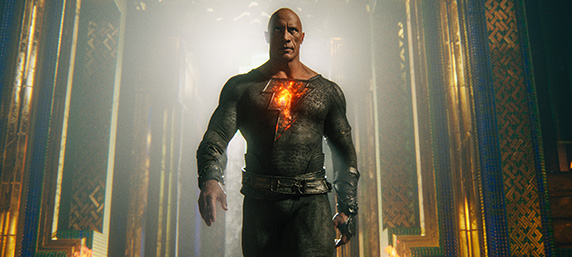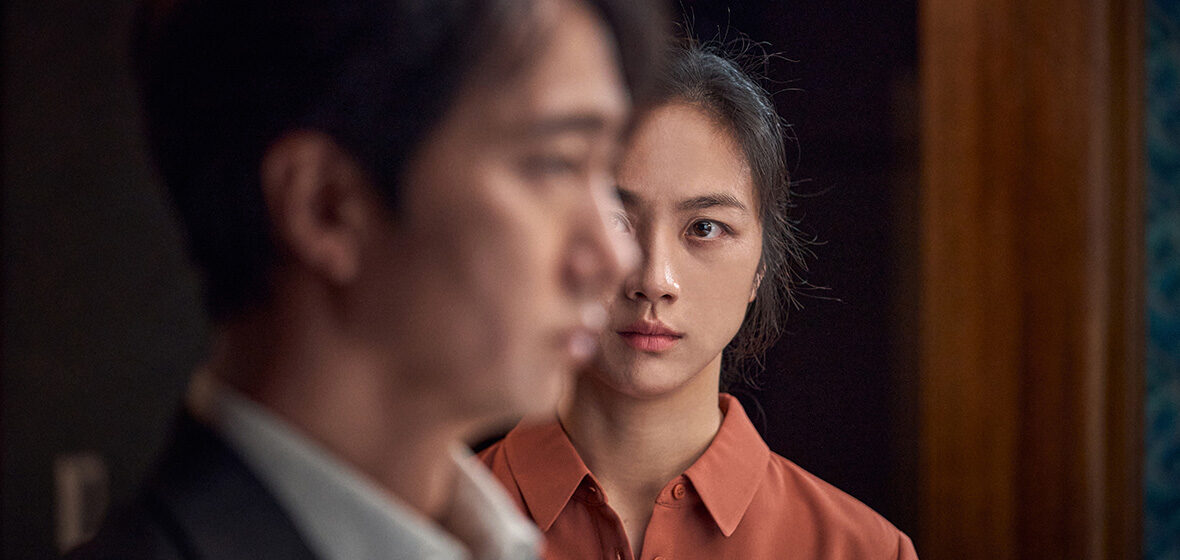LSJ Media and Sony Pictures have 10 double tickets to give away for The Woman King.
The Woman King is the remarkable story of the Agojie, the all-female unit of warriors who protected the African Kingdom of Dahomey in the 1800s with skills and a fierceness unlike anything the world has ever seen. Inspired by true events, The Woman King follows the emotionally epic journey of General Nanisca (Oscar®-winner Viola Davis) as she trains the next generation of recruits and readies them for battle against an enemy determined to destroy their way of life. Some things are worth fighting for. Watch the trailer here.
The Woman King is in cinemas 27 October. To enter, please send your postal address and LawID number to [email protected] by 5pm on Monday 24 October.
Decision to Leave
Rating: 5 out 5 stars
Park Chan-wook is a director who’s gained a constant presence in the minds of cinephiles. His work is a solid collection of complex films with a political or psychological edge. It’s not surprising that he’s a philosophy student dropout: his movies exude that energy. In 2004, a young film student would have replaced their Pulp Fiction poster with one of Old Boy or, if really wanting to show off their film knowledge, JSA — Joint Security Area.
It’s easy to enjoy Chan-wook’s films. They’re well plotted with good twists, surprises along the way, and intellectual weight that adds an element of prestige. Chan-wook may not have invented modern South Korean cinema, but he was the first to put it on the international stage. In a way, he walked so that Bong Joon Ho, director of Parasite, could run.
Even today, when Chan-wook releases a new film, the kingdom of film nerds pays close attention. It’s not normal for him to disappoint (in my opinion, only Thirst and Stoker, his only English-language attempts, fail to impress), and it has been six years since the intense and lurid The Handmaiden. So expectations are high and, not surprisingly, have been fully met.
Decision to Leave is a film I could happily recommend to anyone who likes pure narrative entertainment. It’s a noir thriller with two compelling characters at the centre, an unexpected plot and, the cherry on top, hugely funny. It’s charming and romantic, and executed with such elegance that it’s not surprising Chan-wook took out the Best Director prize this year at Cannes. There’s no hope for you if you find this film boring: it means you’re already irretrievably lost to low-attention spam. Decision to Leave is a delight.
But let’s start with the story. As in every noir, there’s a dame. Here is Seo-rae (Tang Wei), a Chinese caregiver whose older, wealthy husband lies dead at the bottom of a mountain after a freak climbing accident. The case seems straightforward, but for detective Hae-jun (Park Hae-il), something doesn’t sit right with the wife’s account. Her alibi is ironclad, and of course not everyone has to react with dramatic panache at the sight of the decomposed body of their husband. The problem is that Hae-Jun is addicted to action. He lives with his wife in a small quiet community but commutes every day to Busan, so he can be close to where the fun police cases are. This puts some strain on his marriage, which he and his wife work on fixing, but to no avail. Thankfully the femme fatale our sleuth pursues gives him what he needs to combat his chronic insomnia. Decision to Leave is the story of an ageing man finding his comfort zone, and a woman who refuses to reside in it.
I could write all day about this director’s choice of shots, and his use of reflections (a symbol of how we look at ourselves before we begin transforming ourselves); even something as simple as an interrogation scene is executed with more class than a simple “shot/reverse shot”. But what baffled me was the story’s structure.
Halfway through this film that runs longer than two hours, it seems that Chan-wook is wrapping everything up, leaving us with a bittersweet but satisfying ending. There certainly wouldn’t be anything wrong with ending this film with the message: “Stay in your lane; you already have everything you need”, but Chan-wook is nothing less than poetic, and no character of his could finish in a state of contentment without risking that very state one last time. So, suddenly the film that seemed close to ending is given a new breath of life and another good hour of intrigue, this time with a more romantic angle.
It’s easy to dismiss Decision to Leave as purely Hitchcockian in style, but it’s also hard not to compare it to Vertigo, especially in terms of how the film makes us feel. It is definitely lighter, and even funnier, than the classic film — and, I reiterate, Decision to Leave is very funny — but, as with the British filmmaker, there is a deliberate choice to add as much visual panache as possible to an elaborate intrigue that has been made, above all, to entertain. Nothing more Hitchcockian than that.

Black Adam
Rating: 3 out of 5 stars
Film as an art form is an odd thing. It involves all kinds of performative, visual and narrative gestures, delivered in an expensive package that, more often than not, is expected to bring a return on its investment. Merging all these art forms together is in itself an art form. It requires juggling all its elements in a balanced way so that nothing feels too overwhelming. The intent is to connect the filmmaker with the intended audience. Decision to Leave is a perfect example of how all these elements merge satisfyingly when the author’s inventiveness pays off.
Unlike Decision to Leave, there is a lot that goes wrong with Black Adam, but the latter film emerges relatively unscathed – in the end, for all its flaws, it is an enjoyable watch.
Black Adam is a new title in the already confusing and disjointed DC cinematic universe, a brooding anti-hero that serves as the anti-Shazam. Do you remember that 2019 blockbuster where a kid shouts “Shazam” and transforms into a buffed-up Zachary Levi, and the whole thing feels like an enjoyable antidote to the other sombre DC films? Black Adam is set in the same space, but instead of being about an awkward teenager enjoying a new superpower, it’s about a vengeful man from pre-dynastic Egypt who transforms into Dwayne Johnson and unwittingly ends up helping a fictitious Middle-Eastern country to defeat a divine threat.
The problem with Black Adam is that it tries to do too much for the first film of this kind. It starts with an exciting prologue set several thousand years ago, where a teen’s rebellious actions lead to an unexpected slave rebellion. Then in a modern setting the country of Kahndaq struggles with political instability and the control of the western military. Another rebellious teen, wearing a hoodie and rolling down on a skateboard, calls out to an Australian army man that the forces of peace only bring disturbances and checkpoints. Unfortunately, this kind of self-aware political commentary ends right there, as the rest of the film plunges into mindless action and a veiled apology for neo-colonialism.
The teen (Bodhi Sabongui) is the son of an intrepid archeologist (Sarah Shahi) in search of an ancient crown known to give dangerous powers to whomever controls it. In the process, she awakens Teth Adam (Dwayne Johnson) as the historic champion of the small country who defeated tyranny. But Adam cares little about helping and more about a statue of himself. At the same time, a team of superheroes, concerned about the discovery of the crown MacGuffin and the thousand-year-old hero, arrive in the country to save the people who did not ask to be saved — because at this point, the anti-colonial message of the start has been lost.
The team includes Dr Fate (Pierce Brosnan) as NOT Doctor Strange, Hawkman (Aldis Hodge), a millionaire with a flying suit but NOT Iron Man, Atom Smasher (Noah Centino) as NOT Ant-man and Cyclone (Quintessa Swindell) as NOT Storm. I’m probably being too mean about the characters, but it’s impossible not to see the similarities all of them have to already established characters from a rival studio. DC missed an opportunity to modernise its characters here.
The problem is that there is no clear thematic focus for each character, and not enough time spent on character development. When it lacks a raison d’être, a character will lack personality too, despite the best efforts of the actor portraying it. This film leaves us with many unanswered questions: Why is the archeologist important, beyond having a reason to enter an excavation site? Why is her son important beyond being kidnapped to convince Adam to join the fight? Why are we presented with four new superheroes if they don’t represent the continuing political meddling of the West? There are a couple of action sequences where these four create so much havoc that innocent citizens have to die, or at the very least see their homes and businesses destroyed. And many loose threads — there is no follow through on the ideas introduced in the film.
If it’s actors who could save this film, Brosnan and Hodge could do it. It’s good to see them in top form, selling their characters with the little they’ve been given. But I still hold that Dwayne Johnson was miscast. He’s too sympathetic and friendly an actor, with a range that probably doesn’t reach the level of profound ennui the character requires. Black Adam is supposed to be The Punisher meets Superman, a powerful being who doesn’t care about anything, not even himself. And an actor who can only show contempt by raising an eyebrow is not the best choice.
And yet the film pulsates and entertains. Director Jaume Collet-Serra puts all his heart and soul into fun action set pieces that may be CGI fests, but are very well directed nevertheless. If the idea was to provide good ol’ unashamed entertainment, then why overcomplicate the plot? All that was asked of the first film in the franchise was to build the world and introduce the mythology while intercutting this with some old-school punch-ups. Unfortunately, there wasn’t enough talent to meet the kind of expectations the studio had for this story.
See it once, have a beer, and forget about it. The second one will, we hope, be better.




